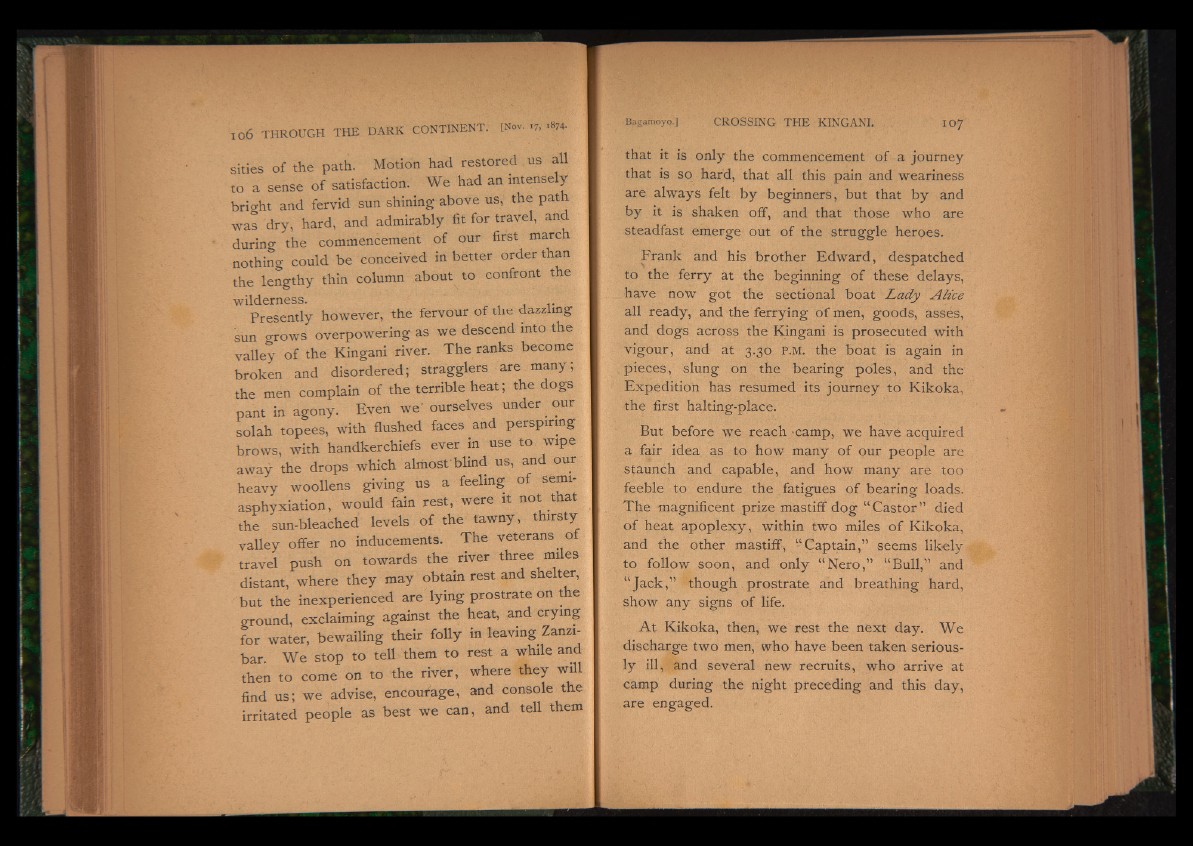
sities of the path. Motion had restored us all
to a sense o f satisfaction. W e had an intense y
bright and fervid sun shining above us, the path
was dry, hard, and admirably fit for travel, and
during the commencement o f our first march
nothing could be conceived in better order than
the lengthy thin column about to confront the
wilderness. ...
Presently however, the fervour of the dazzling
sun grows overpowering as we descend into the
valley o f the Kingani river. T h e ranks become
broken and disordered; stragglers are many;
the men complain o f the terrible heat; the dogs
pant in agony. Even we' ourselves under our
solah topees, with flushed faces and perspiring
brows, with handkerchiefs ever in use to wipe
away the drops which almost blind us, and our
heavy woollens giving us a feeling o f semiasphyxiation,
would fain rest, were it not that
the sun-bleached levels o f the tawny, thirsty
v a lle y offer no inducements. T h e veterans o
travel push on towards the river three miles
distant, where they may obtain rest and shelter,
but the inexperienced are lying prostrate on the
ground, exclaiming against the heat, and crying
for water, bewailing their fo lly in leaving Zanzibar.
W e stop to tell them to rest a while and
then to come on to the river, where they will
find us; w e advise, encourage, and console the
irritated people as best we can, and tell them
that it is only the commencement o f a journey
that is so hard, that all this pain and weariness
are always felt b y beginners, but that b y and
b y it is shaken off, and that those who are
steadfast emerge out of the struggle heroes.
Frank and his brother Edward, despatched
to the ferry at the beginning o f these delays,
have now got the sectional boat Lady A lice
all ready, and the ferrying o f men, goods, asses,
and dogs across the Kingani is prosecuted with
vigour, and at 3.30 P.M. the boat is again in
pieces, slung on the bearing poles, and the
Expedition has resumed its journey to Kikoka,
the first halting-place.
But before we reach -camp, we havO acquired
a fair idea as to how many o f our people are
staunch and capable, and how many are too
feeble to endure the fatigues o f bearing loads.
T he magnificent prize mastiff dog “ Castor §: died
o f heat ap op le x y , within two miles o f Kikoka,
and the other mastiff, s “ Captain,” seems like ly
to follow soon, and only “ Nero,” “ Bull,” and
“ Jack,” though prostrate and breathing hard,
show any signs o f life.
A t Kikoka, then, we rest the next day. W e
discharge two men, who have been taken seriously
ill, and several new recruits, who arrive at
camp during the night preceding and this day,
are engaged.